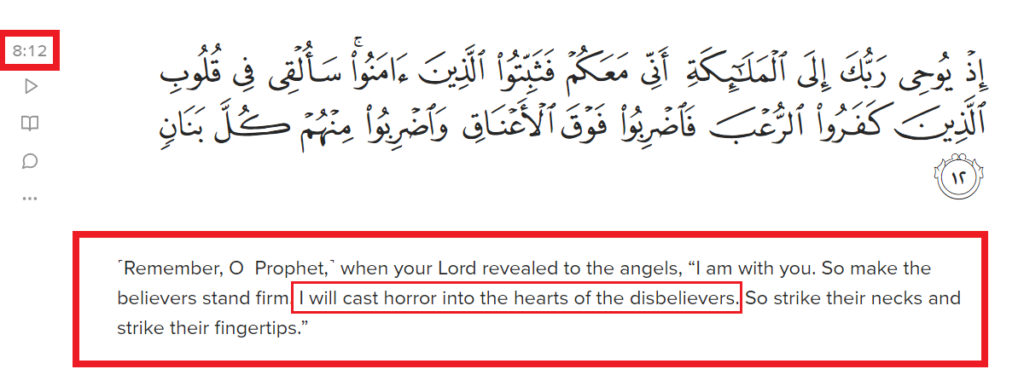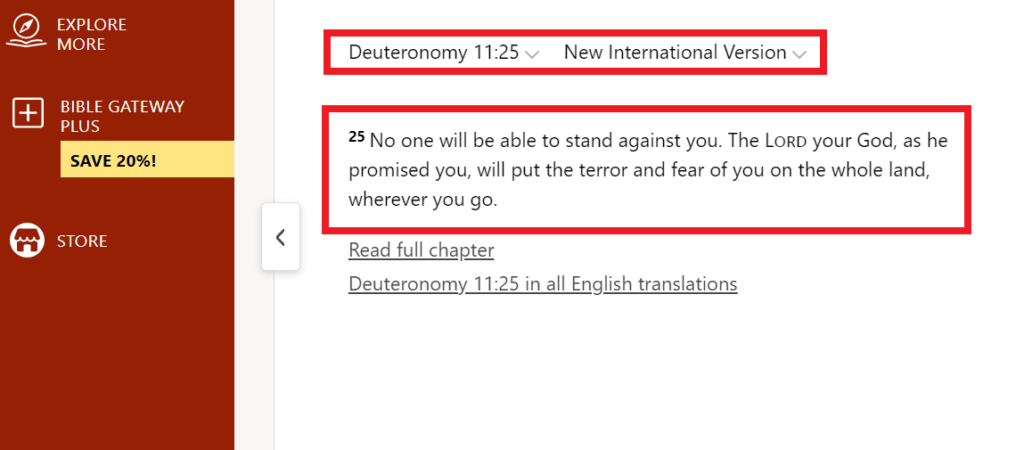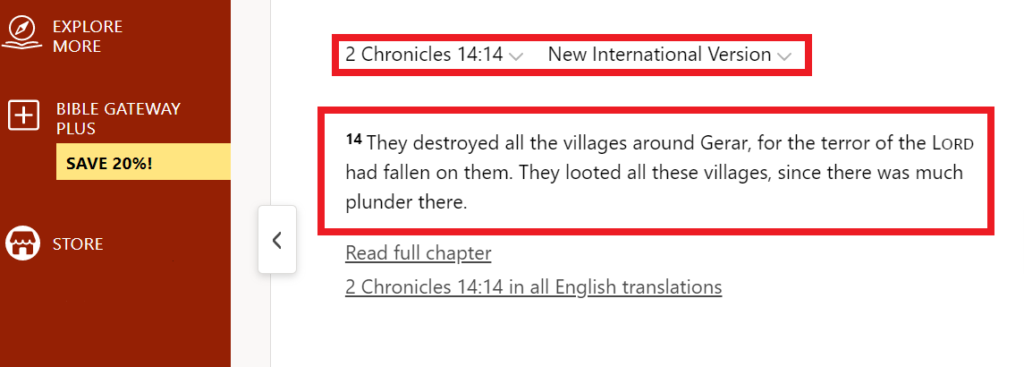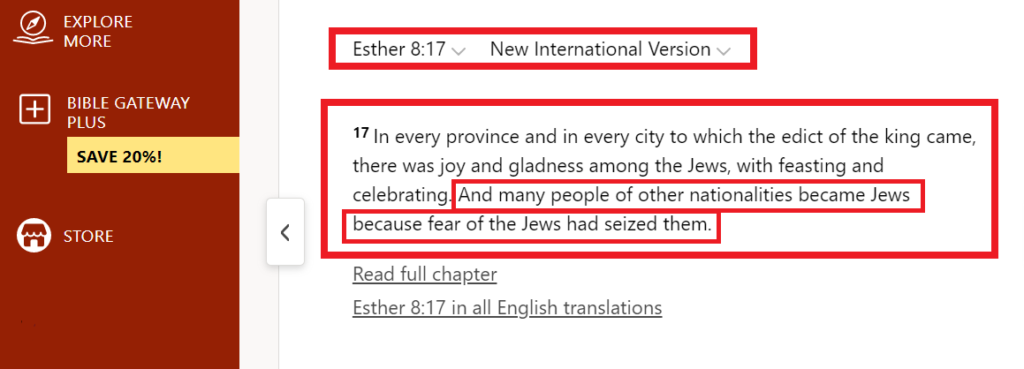𝐓𝐡𝐞 “𝐈 𝐡𝐚𝐯𝐞 𝐛𝐞𝐞𝐧 𝐦𝐚𝐝𝐞 𝐯𝐢𝐜𝐭𝐨𝐫𝐢𝐨𝐮𝐬 𝐰𝐢𝐭𝐡 𝐭𝐞𝐫𝐫𝐨𝐫” 𝐚𝐧𝐝 ” 𝐈 𝐡𝐚𝐯𝐞 𝐛𝐞𝐞𝐧 𝐡𝐞𝐥𝐩𝐞𝐝 𝐛𝐲 𝐭𝐞𝐫𝐫𝐨𝐫” 𝐇𝐚𝐝𝐢𝐭𝐡𝐬 – 𝐈𝐧 𝐂𝐨𝐧𝐭𝐞𝐱𝐭
Mohamad Mostafa Nassar
Twitter:@NassarMohamadMR
Introduction
When the Prophet defeated his enemies from the Romans in the Battle of Tabuk WITHOUT a fight; May God grant him victory with the terror that he hurled into the hearts of his enemies.
The Prophet said this hadith, as he reminded of the blessings of Allah Almighty upon him, as stated in the hadith. This indicates the Prophet’s loyalty to his Lord for him and proclaiming the blessings of your Lord.
“And proclaim the blessings of your Lord.” Quran (93:11)
Allah gave him victory over his enemies WITHOUT fighting or bloodshed, and the earth was made for him as a place of worship and purification, and the spoils were made lawful for him, and he was given comprehensive words, that is, the few words that carry many meanings, and he was sent to people in general, and in some accounts, he was sent to all creation;
There is no doubt that this hadith indicates the greatness of our beloved Prophet, the truth of his prophethood, and Allah’s support for him.
The Clarity of the Glorious Quran on not forcing any non-Muslim to be Muslim:
The Glorious Holy Qur’an is crystal clear in stating that no non-Muslim is forced to be Muslim by any coercion, Islam does not want hypocrites. In fact, Islam warns us against hypocrites, to the point that there is whole chapter dedicated to warning us against hypocrites by the same name Surah Al-Munafiqun= chapter hypocrites’ number sixty-three.
Hence Allah Exalted he states clearly in the Noble Quranic verse:
“Let there be no compulsion in religion, for the truth stands out clearly from falsehood. So, whoever renounces false gods and believes in Allah has certainly grasped the firmest, unfailing hand-hold. And Allah is All-Hearing, All-Knowing.” Quran (2:256)

Allah Exalted he also instruct us Muslims NOT to attack innocents, or wage wars against anyone who never attacked Islam and Muslims nor supported anyone directly or indirectly against Islam and Muslims.
Allah Exalted he states in the Glorious Quran:
“Fight in the cause of Allah ˹only˺ against those who wage war against you, but do not exceed the limits. Allah does not like transgressors.” Quran (2:190)

Despite the above, Allah exalted he stated in the Glorious Quran in several noble verses what confirms that meaning of the hadith of I have been made victorious with terror, The hadith does not mean that the Prophet who is instructed to cast terror or horror at the hearts of the enemies of Islam.
In fact, Allah himself Exalted He is the one who casts horror at the hearts of the disbelievers who have been fighting Islam, such horror played role in making some of the enemies of Islam escape the battlefield and withdraw even before a direct armed confrontation with Muslims under the leadership of our beloved Prophet and even after our Prophet passed away, when Muslims abided by Islam.
Here Some examples of Noble Quranic verses that confirms that such horror is casted in the hearts of the disbelievers by Allah Exalted He and not by the Prophet or Muslims.
“˹Remember, O Prophet,˺ when your Lord revealed to the angels, “I am with you. So, make the believers stand firm. I will cast horror into the hearts of the disbelievers. So, strike their necks and strike their fingertips.” Qurna (8:12)

And
“Fight in the cause of Allah ˹ONLY˺ against those who wage war against you, but do NOT exceed the limits. Allah does not like transgressors.” (Quran (2:190)

And
“But no! Allah is your Guardian, and He is the best Helper. We will cast horror into the hearts of the disbelievers for associating ˹false gods˺ with Allah—a practice He has never authorized. The Fire will be their home—what an evil place for the wrongdoers to stay!” Quran (3:150-151)

And
“He is the One Who expelled the disbelievers of the People of the Book from their homes for ˹their˺ first banishment ˹ever˺. You never thought they would go. And they thought their strongholds would put them out of Allah’s reach. But ˹the decree of˺ Allah came upon them from where they never expected. And He cast horror into their hearts so they destroyed their houses with their own hands and the hands of the believers. So take a lesson ˹from this˺, O people of insight!” Quran (59:2)

The Bible mentions that God helps His followers by casting terror into the hearts of their enemies, as was the case with our Prophet, in several places, including:
Deuteronomy 11:25
New International Version
25 No one will be able to stand against you. The Lord your God, as he promised you, will put the terror and fear of you on the whole land, wherever you go.

2 Chronicles 14:14
New International Version
14 They destroyed all the villages around Gerar, for the terror of the Lord had fallen on them. They looted all these villages, since there was much plunder there.

Esther 8:17
New International Version
17 In every province and in every city to which the edict of the king came, there was joy and gladness among the Jews, with feasting and celebrating. And many people of other nationalities became Jews because fear of the Jews had seized them.

These two hadiths are typically misquoted in the hopes of arguing that Islam promotes terrorism. They are as follows:
Narrated Abu Huraira: Allah’s Messenger (ﷺ) said, “I have been sent with the shortest expressions bearing the widest meanings, and I have been made victorious with terror (cast in the hearts of the enemy), and while I was sleeping, the keys of the treasures of the world were brought to me and put in my hand.” Abu Huraira added: Allah’s Messenger (ﷺ) has left the world and now you, people, are bringing out those treasures (i.e. the Prophet did not benefit by them).
Abu Huraira reported that the Messenger of Allah (may peace be upon him) said: I have been given superiority over the other prophets in six respects: I have been given words which are concise but comprehensive in meaning; I have been helped by terror (in the hearts of enemies): spoils have been made lawful to me: the earth has been made for me clean and a place of worship; I have been sent to all mankind and the line of prophets is closed with me.
Discussion
The main argument obviously revolves around the use of the term “terror”. This is explained as follows:
You have also referred to another saying of the Prophet’s: “I have been made victorious by terror.” The actual word used by the Prophet was “ru’b”, which really means “anxiety and fear”. In the context of the hadith, what the Prophet meant was that his enemies who heard of him were filled with anxiety and fear.
This was owing to his growing acceptance among people and to his increasing prestige and power; and not because of any “act of terrorism” as is alleged by the enemies of Islam today. The hadith was not misunderstood in Arabic, though to the modern Islam-bashers it gives a chance for misinterpretation by a distortion of nuance.
For more reading about Does Islam want to Force People to be Muslims Or remain Muslims Check Here:
Does Islam Force Itself On Others?
The meaning of the term terror is not the same as terrorism. One cannot fallaciously conflate terror with terrorism because they have entirely different definitions.
Referencing this hadith in such a way effectively commits the Definist Fallacy which is as follows:
The Definist Fallacy occurs when someone unfairly defines a term so that a controversial position is made easier to defend.
Internet Encyclopedia of Philosophy
Fallacies A fallacy is a kind of error in reasoning. The list of fallacies below contains 231 names of the most common fallacies, and it provides brief explanations and examples of each of them. Fallacious arguments should not be persuasive, but they too often are.
Fallacies may be created unintentionally, or they may be created intentionally in order to deceive other people. The vast majority of the commonly identified fallacies involve arguments, although some involve only explanations, or definitions, or other products of reasoning.
Sometimes the term “fallacy” is used even more broadly to indicate any false belief or cause of a false belief.
The list below includes some fallacies of these sorts, but most are fallacies that involve kinds of errors made while arguing informally in natural language. A charge of fallacious reasoning always needs to be justified. The burden of proof is on your shoulders when you claim that someone’s reasoning is fallacious.
Even if you do not explicitly give your reasons, it is your responsibility to be able to give them if challenged. An informal fallacy is fallacious because of both its form and its content. The formal fallacies are fallacious only because of their logical form.
For example, the Slippery Slope Fallacy is an informal fallacy that has the following form:
Step 1 often leads to step 2. Step 2 often leads to step 3. Step 3 often leads to…until we reach an obviously unacceptable step, so step 1 is not acceptable. That form occurs in both good arguments and fallacious arguments.
The quality of an argument of this form depends crucially on the probabilities of going from one step to another. The probabilities involve the argument’s content, not merely its form. The discussion below that precedes the long alphabetical list of fallacies begins with an account of the ways in which the term “fallacy” is imprecise.
Attention then turns to the number of competing and overlapping ways to classify fallacies of argumentation. For pedagogical purposes, researchers in the field of fallacies disagree about the following topics: which name of a fallacy is more helpful to students’ understanding; whether some fallacies should be de-emphasized in favor of others; and which is the best taxonomy of the fallacies.
Researchers in the field are also deeply divided about how to define the term “fallacy” itself, how to define certain fallacies, and whether any theory of fallacies at all should be pursued if that theory’s goal is to provide necessary and sufficient conditions for distinguishing between fallacious and non-fallacious reasoning generally.
Analogously, there is doubt in the field of ethics regarding whether researchers should pursue the goal of providing necessary and sufficient conditions for distinguishing moral actions from immoral ones.
Terror is extreme fear whereas terrorism is politically motivated attacks targeting civilians. In no way, shape or form does this narration condone terrorism.
Attempting to justify attacking civilians from hadiths that state the Prophet ﷺ was made victorious with terror (granted the use of such a translation) meaning extreme fear (most usually in the context of a battle), is indeed nonsense.
Therefore, at the forefront, we know the apologist is engaging in a deceptive and fallacious argument by citing this narration.
We know for sure that such actions are not permitted, as the following hadiths demonstrate:
Narrated ‘Abdullah bin ‘Amr: The Prophet (ﷺ) said, “Whoever killed a person having a treaty with the Muslims, shall not smell the smell of Paradise though its smell is perceived from a distance of forty years.”
Sahih Bukhari 3166 (cf. Sahih Bukhari 6914, Sunan Abu Dawud 2760, Sunan an-Nasa’i 4747, Sunan Ibn Majah 2686, Sunan Ibn Majah 2687)
Shaykh al-Islam Ibn Hajar al-Asqalani commented on this hadith writing:
Anyone who has a contract with the Muslims, whether by jizya (tax), by truce from a sultan, or by security from a Muslim, is included.
Hafiz Abu al-Fadl Ibn Hajar al-‘Asqalani, Fath al-Bari Sharh Sahih al-Bukhari (vol. 12 p. 259). Sourced from Refuting ISIS, 1st edition, pp. 33, 50
Many more narrations and verses can be cited which also demonstrate how terrorism is forbidden:
Sunan al-Tirmidhī 1408
Buraydah reported: If the Messenger of Allah, peace and blessings be upon him, sent a commander to the army, he would enjoin him personally to fear Allah and to be good to the Muslims who were with him, saying: Go forth in the name of Allah and in the way of Allah. Fight against those who deny. Go forth and do not plunder, do not commit treachery, do not mutilate, and do not kill children.
Grade: Sahih (authentic) according to al-Tirmidhi
Sunan Abu Dawud 2608
Go forward in the name of Allah, with Allah, and upon the religion of the Messenger of Allah. Do not kill the elderly, children, young people, or women. Do not steal from the spoils but collect them, and behave righteously and in the best manner. Verily, Allah loves those who behave in the best manner.
Grade: Hasan (fair) according to al-Arna’ut
Ṣaḥīḥ al-Bukhārī 2851
Abdullah ibn Umar, may Allah be pleased with him, said: A woman was found killed in one of the battles of the Messenger of Allah, peace and blessings be upon him, so the Messenger of Allah condemned the killing of women and children.
Grade: Muttafaqun Alayhi=agreed upon its authnticity
Musnad Ahmad 6643
Abdullah ibn Amr reported: The Messenger of Allah, peace and blessings be upon him, said, “Verily, the worst transgressors to Allah are those who kill in the sacred mosque, those who kill whoever did not fight him, or those who kill with the vindictiveness of ignorance.”
Grade: Sahih (authentic) according to Ahmad Shakir
The foundation for not harming non-combatants can also be found in the Quran:
Quran 2:190
Fight in God’s cause against those who fight you, but do not overstep the limits: God does not love those who overstep the limits.
(Abdel Haleem)
Ibn Abbas (RA) commented on this verse saying:
Do not kill women, children, old men, or whoever comes to you with peace and he restrains his hand from fighting, for if you did so you would have certainly transgressed.
Tafsīr al-Ṭabarī 2:190
Quran 60:7-9
God may still bring about affection between you and your present enemies- God is all powerful, God is most forgiving and merciful-and He does not forbid you to deal kindly and justly with anyone who has not fought you for your faith or driven you out of your homes: God loves the just. But God forbids you to take as allies those who have fought against you for your faith, driven you out of your homes, and helped others to drive you out: any of you who take them as allies will truly be wrongdoers.
(Abdel Haleem)
Imam at-Tabari’s Tafsir on Q 60:8 is as follows:
The most accurate opinion concerning this [issue] is that of one who says, “What is intended by this verse (60:8) are members of all ways of life and all religions; that you are kind to them, join relations with them and treat them justly.”
This is because Allah, Mighty and Majestic is He, makes a general statement [in the verse] that includes anyone who fits the description. He does not designate some people to the exclusion of others. The claim that the verse is abrogated is meaningless.
Muwatta of Imam Malik 963
Do not kill women or children or an aged, infirm person. Do not cut down fruit-bearing trees. Do not destroy an inhabited place. Do not slaughter sheep or camels except for food. Do not burn bees and do not scatter them. Do not steal from the booty, and do not be cowardly.
Terrorism has been defined as the “the unlawful use of violence and intimidation, especially against civilians, in the pursuit of political aims.”[40] Any form of terrorism, or violation of non-aggression principles, is an entirely illegitimate war crime in both Islamic law and modern just war theory, for all of the reasons we have outlined up to this point.
Sometimes, regrettably, the Quran is translated in a manner that seems to encourage terror, such as the verse: “Prepare whatever forces you [believers] can muster, including warhorses, to frighten off God’s enemies and yours, and warn others unknown to you but known to God.” Quran (8:60) [41]
The context is evident that the purpose is not to frighten whole societies or intimidate people towards some self-serving political goal, but instead to deter potential threats. The “fear” or “terror” is not generated from an actual attack, especially not an attack on civilians or their property.
The purpose is deterrence, not terror. Moreover, immediately following this verse is the command to accept peace, as previously cited, which lets us know that such deterrence only applies to enemy aggressors.
Deterrence is another legitimate action in just war theory. According to political scientists Frank Zagare and D. Marc Kilgour, successful deterrence to avoid war requires not only capability but also credibility within “the norm of reciprocity.”[42] When a state has both the capability and credibility to carry out a threat or respond to an attack, war is less likely to break out.
A state that attacks another state should expect a counter-attack. During the Cold War, it was the doctrine of mutually-assured destruction or “the balance of power,” rooted in reciprocal deterrence, that prevented the Soviet Union and the United States from unleashing a global nuclear holocaust.
In order to preserve the peace, the Quran advocates for building up military preparation as a deterrent against possible threats. This is the context in which “terror” is used in the Quran, even though the term used could be translated differently to avoid this undue connotation.
The Quran in no way justifies the intentional killing of innocent civilians, or “terrorism” as understood today. Even Bernard Lewis, a scholar known to be highly critical of Muslims, admits as much, “At no point do the basic texts of Islam enjoin terrorism and murder.”[43]
As the serious academic study of terrorism has shown, the alleged relationship between Islam and terrorism is spurious at best and dangerous at worst. Political scientist Robert Pape studied suicide terrorist attacks committed by Muslim extremists (or deviants, a more accurate description) and found that Islam itself was not the motivation:
The data show that there is little connection between suicide terrorism and Islamic fundamentalism, or any one of the world’s religions… Rather, what nearly all suicide terrorist attacks have in common is a specific secular and strategic goal: to compel modern democracies to withdraw military forces from territory that terrorists consider to be their homeland.
Religion is rarely the root cause, although it is often used as a tool by terrorist organizations in recruiting and in other efforts in service of the broader strategic objective.[44]
Pape also warns about the dangers of policies that assume Islam to be the root cause of terrorism, “…the presumed connection between suicide terrorism and Islamic fundamentalism is misleading and may be encouraging domestic and foreign policies likely to worsen America’s situation and to harm many Muslims needlessly.”[45] Muslims and non-Muslims are both being hurt by an erroneous political discourse that blames Islam, and nothing else, for terrorism.
Joseph Schwartz, another political scientist, writes that even the horrendous attacks of 9/11 had little to do with the Islamic faith and everything to do with resistance to American foreign policy in the Middle East (expressed using illegitimate means):
But such movements are not simply the creation of warped, irrational minds. Terrorist rage, no matter how ineffective, often arises from totally comprehensible political grievances. To treat Al-Qaeda as an irrationalist cult of slaughter is to ignore the potential rational logic behind its attack on the World Trade Center, a logic that the United States played into by subsequently attacking Afghanistan.[46] Many real political grievances can motivate terrorists:
U.S. support for Israel’s brutal occupation of Palestine, the U.S. invasion and destruction of Iraq, the sanctions preceding the Iraq war that killed as many as half a million people, the ongoing U.S. support for repressive governments, and so on. While none of these grievances justify terrorism in any way, they nonetheless provide the oxygen that is fueling attacks against the U.S. and its allies.
Explaining to these terrorists that Islam condemns their methods is ineffective because Islam is not their motivation, despite what their propaganda says. While Muslim scholars can continue to make the obvious case against terrorism in the name of Islam, a three-pronged approach to challenging terrorism is needed:
a sustained effort to advocate for humanitarian policy reforms in the Muslim world; challenging failed and unjust U.S policies and actions that create fertile grounds for terrorist recruitment; alongside a continued delegitimization campaign against the warped criminal enterprises that recruit vulnerable individuals to engage in indiscriminate violence for the advancement of said enterprises in the name various causes they hijack.
[40] Oxford English Dictionary online; Terrorism | Definition of Terrorism by Oxford Dictionary on Lexico.com also meaning of Terrorism.
[41] Surat al-Anfal 8:60; Abdel Haleem, The Qur’an, 185.
[42] Zagare, Frank C., and D. M. Kilgour. Perfect Deterrence. (Cambridge, UK: Cambridge University Press, 2000) 296.
[43] Lewis, Bernard. The Crisis of Islam: Holy War and Unholy Terror. (New York: Modern Library, 2003) 39.
[44] Pape, Robert. Dying to Win: The Strategic Logic of Suicide Terrorism. (New York: Random House Trade Paperbacks, 2006) 4.
[45] Ibid. 3.
[46] Schwartz, Joseph M. “Misreading Islamist Terrorism: the “War against Terrorism” and Just-War Theory.” Metaphilosophy. 35.3 (2004): 273-302, 284.
Conclusion
The above-mentioned hadiths does not permit terrorism in any ways shape or form, to say it does is simply a non-sequitur. In fact as explained in the introduction of this article, Allah Exalted He prohibts attacking anyone who did not attack Islam or Muslims and fair to them.
However the casting of horror or terror at the hearts of the disbelievers who fight Islam and Muslims is an act of Allah to deter the agressors and support Muslims psychologically.
In truth, the Prophet Muhammad (peace be upon him) never desired anything of the worldly pleasures. His mission was solely to please his Lord and spread the true message across the land, calling people to morality, justice and peace achieved through submission to God.
Allah Knows Best.
References:
Revisiting ‘I Have Been Commanded To Fight…’ Hadith
The Hadith ‘…Fight Until They Say There Is No god But Allah’ Explained
Allah Made Me Victorious By Awe, (By Frightening My Enemies) For a Distance of One Month’s Journey
I have been made victorious with terror
Does Islam Force Itself On Others?
Jihad – The way of peace and Justice, the path to Heaven.
Response to the misunderstanding surrounding the Sword Verse Quran (9:5)
The Sword Verse”: Surah 9:13 – 24
An Historical Examination Of The Sword Verse – Surah 9:5
A Historical Examination of The Sword Verse – Surah 9:5